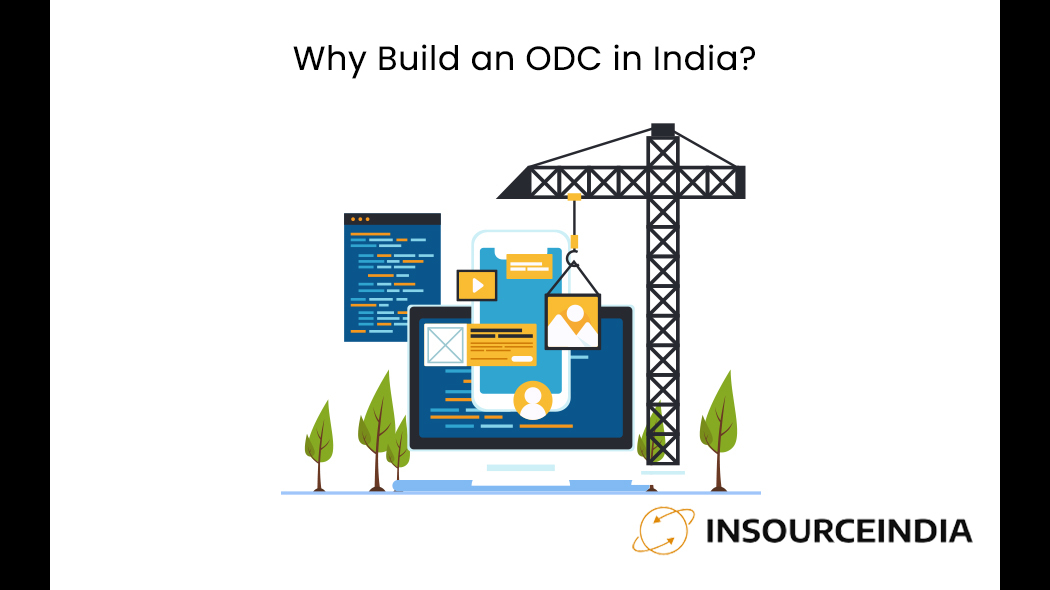India has emerged as a leading destination for setting up offshore development centers (ODCs) for many global companies. ODCs are dedicated centers that are established by companies to outsource a part of their software development process. India has been an attractive location for ODCs due to its cost-effectiveness, availability of skilled resources, and favourable business environment.
In this blog, we will discuss in detail why building an ODC in India can be a wise choice for companies.
 Cost-effectiveness:
Cost-effectiveness:
One of the primary reasons why businesses choose to set up an ODC is cost savings. Offshore locations typically have lower labour costs, allowing businesses to save money on salaries and benefits. In addition, ODCs can be set up in areas with favourable tax laws, further reducing the overall cost of operations.
However, the cost-effectiveness of an ODC also depends on its efficiency and productivity. While labour costs may be lower, businesses must ensure that the workforce is skilled and can deliver high-quality work within the desired timeframe. Additionally, the infrastructure and technology available in the ODC must be up to par to support the project requirements and ensure efficient operations.
Companies can save up to 50% on operational costs by outsourcing their software development to India. Moreover, India offers a favourable exchange rate, making it an attractive option for foreign companies looking to invest in an offshore development center.
 Skilled resources:
Skilled resources:
India has emerged as a global IT powerhouse in recent years, with a rapidly growing pool of skilled IT professionals. The country produces more than 2.5 million software engineers each year. Many of these engineers are proficient in languages such as Java, Python, and Ruby on Rails. The country’s thriving IT industry has led to a significant increase in the demand for IT skills, with expertise in areas such as software development, data analytics, artificial intelligence, and cybersecurity being particularly in demand.
India’s vibrant start-up ecosystem has also fueled the need for IT skills, as entrepreneurs look to build and scale innovative digital products and services. India also has a robust education system, with many universities and colleges offering specialized courses in software engineering, data analytics, and other IT-related fields. In response to this growing demand, a number of universities and training institutes across the country are offering IT courses and certification programs, helping to equip the next generation of Indian IT professionals with the skills they need to succeed in the global market. The availability of skilled resources makes it easier for companies to find the right talent for their ODCs.

Favourable business environment:
India has a business-friendly environment that supports foreign investment. The country has simplified its regulatory framework and has introduced various reforms to improve the ease of doing business. The Indian government has also launched several initiatives to support the growth of the IT industry, such as the Software Technology Parks of India (STPI), which offers tax benefits and other incentives to IT companies. In addition, India has a robust IT infrastructure, including high-speed internet connectivity, advanced telecom networks, and modernized data centers.
The Indian government has also implemented several policies and initiatives to support the growth of the IT industry, including tax incentives, simplified regulations, and streamlined procedures for establishing and operating businesses.
 Time zone advantage:
Time zone advantage:
India’s time zone advantage makes it an attractive option for companies looking to set up ODCs. India is 12 hours ahead of the US and 5-6 hours ahead of Europe. This time difference allows for better collaboration between the onshore and offshore teams, as the ODC can work on tasks during the night, and the onshore team can review and provide feedback during the day.
India’s time zone advantage is a key factor that has contributed to its success as a leading destination for Offshore Development Centers (ODCs).
Being located in the UTC+5:30 time zone, India is ideally positioned to bridge the gap between the American and European markets. This allows Indian ODCs to work with clients in these regions during their business hours, while still having enough time to work on the project outside of these hours. This time zone advantage also enables Indian ODCs to provide 24/7 support and maintenance services, which is highly valued by clients. In addition, the time zone difference allows for faster turnaround times, as work can be handed off from one time zone to another seamlessly, ensuring continuous progress on the project. Overall, India’s time zone advantage has played a crucial role in making it a highly attractive destination for ODCs.
 Cultural compatibility:
Cultural compatibility:
Cultural compatibility plays a crucial role in facilitating effective communication between companies and their offshore development center (ODC) teams. When companies and their ODC teams share similar cultural values, communication becomes easier and more productive. The shared understanding of cultural norms and values leads to a greater appreciation and respect for each other’s viewpoints, resulting in improved collaboration and teamwork. When companies take the time to understand the cultural nuances of their ODC teams, they can build stronger relationships that foster trust and enhance communication. Ultimately, this cultural compatibility can help companies achieve their goals more efficiently and effectively.
India’s cultural compatibility with the western world is another significant advantage. English is widely spoken in India, and most Indians have a good understanding of western culture. This cultural compatibility makes it easier for companies to communicate with their ODC teams and ensures a better understanding of project requirements.
In conclusion, building an ODC in India can be a wise choice for companies looking to outsource their software development. The country offers a cost-effective and skilled resource pool, a favourable business environment, time zone advantage, and cultural compatibility, making it an attractive option for foreign companies. With the right planning and execution, building an ODC in India can be a strategic move that can yield significant benefits for companies in the long run.

 Cost-effectiveness:
Cost-effectiveness: Skilled resources:
Skilled resources:
 Time zone advantage:
Time zone advantage: Cultural compatibility:
Cultural compatibility: